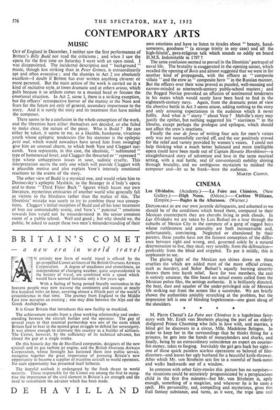CINEMA
Los Olvidados. (Academy.)—La Foire aux Chimeres. (New Gallery.)—High Noon. (Odeon.)—Carbine Williams. (Empire.)—Bugles in the Afternoon. (Warner.) DEPLORABLE as are our own juvenile delinquents, and ashamed as we should be of the conditions which breed them, compared to their Mexican counterparts they are cherubs living in pink clouds. In Les Olvidados we are taken by Luis Buffluel on a tour through the suburbs of Mexico City in the company of a gang of ragged boys whose ruthlessness and amorality are both inconceivable and, unfortunately, convincing. Neglected or abandoned by their parents, these youths have not the faintest conception of the differ- ence between right and wrong, and, governed solely by a natural determination to live, they steal, very sensibly, from the defenceless— preferably from the blind and crippled. To put it mildly, this is unpleasant to see.
The glaring light of the Mexican sun shines down on these cruelties (to which are added most of the more official crimes, such as murder), and Senor Bufiuel's equally burning sincerity throws them into harsh relief. Save for two members, the cast is entirely amateur, the film based on actual events culled from the Mexican police files, the settings authentic. It is brilliantly directed, the heat, dust and squalor of the under-privileged side of Mexican life striking out from the screen like a sunstroke. We are briefly shown the authorities Amiably scratching at the problem, but the impression left is one of blinding hopelessness—one giant shrug of the shoulders.
M. Pierre Chenal's La Foire aux Chimeres is a lugubrious fairy- story with Mr. Erich von Stroheim playing the part of an elderly disfigured Prince Charming who falls in love with, and marries, a blind girl he discovers in a circus, Mlle. Madeleine Sologne. In order to keep her in the surroundings that he thinks fitting for a princess, he gets into the hands of moneylenders and sharks, and finally, being by an extraordinary coincidence an expert on counter- feit money, takes to forging. Inevitably the girl gets back her sight— one of those quick painless scarless operations so beloved of film- directors—and leaves her ugly husband for a beautiful knife-thrower. After which Mr. von Stroheim sets fire to a roomful of bank-notes and walks backwards out of a window.
In common with other fairy-stories this picture has no surprises— the situations could be accurately prognosticated by a perspicacious child in the first five minutes—but Mr. von Stroheim is, aptly enough, something of a magician, and wherever he is he casts a spell. His personality, sad, compelling and mysterious, gives this frail fantasy substance, and turns, as it were, the tripe into real tragedy. It is a joy to be mesmerised again by that bad French accent and that invisible, intangible, indescribable something that is Mr. Erich von Stroheim's genius.
The three other films this week can best be described as bangers. At the Odeon there is Marshal Mr. Gary Cooper looking exceedingly harassed in wedding clothes and a stetson, standing in a deserted Main Street at High Noon waiting to have a bang at a pardoned killer who is returning to get his revenge on the law by the midday train. At the Empire there is Mr. James Stewart impersonating Marsh Williams, the man who, wrongly convicted of murder, spent eight years in prison making a new type of gun with his bare hands and a file, thereby revolutionising the trade and eventually increasing the death-rate. At the Warner there is the sophisticated Mr. Ray Milland as a drummed-out cavalry officer rejoining the army as a private to have a bang at the Sioux at Little Big Horn.
Of these three explosive offerings High Noon, directed by Mr. Fred Zinnemann, comes nearest the bull's eye ; a taut, dramatic Western set at a novel angle, with Mr. Cooper, from whose side all men have fled, appearing as a lone symbol of courage in a dumb and cowardly world. This is an exciting film, and a good one. In Carbine Williams Mr. Stewart gives one of his usual flawless performances, and contrives to make even his bitter, brutalised convict into a touching person. He is ably assisted by Mr. Wendell Corey, but a little hindered, as far



































 Previous page
Previous page